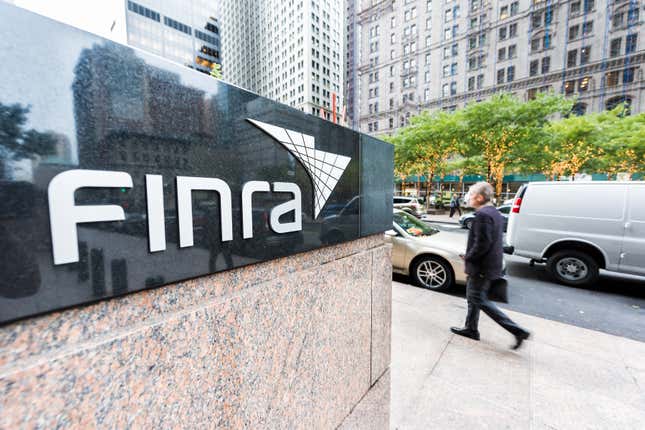
In This Story
The Financial Industry Regulatory Authority (FINRA) is setting the record straight on its new remote and hybrid work oversight rules, which have become a scapegoat for Wall Street firms mandating a return to the office.
The watchdog, which oversees U.S. broker-dealers, regulates any place of work where employees of member firms regularly carry out securities business. Over the coming weeks, FINRA is rolling out new rules that, among other things, will require member firms to periodically provide a list of residential supervisory locations (anywhere employees carry out securities business, including home offices) to FINRA. Starting July 1, FINRA will also launch a pilot program that will allow firms to remotely satisfy inspection obligations.
Bloomberg reported earlier this week that Barclays is considering a five-day in-office mandate for employees in units that fall under FINRA’s purview, and that the bank has pointed to the new rules as a reason behind the push. But FINRA said in a statement that the new rules “are intended to provide member firms greater flexibility — not less.”
“FINRA has seen recent statements from firms stating that new, stringent rules from FINRA will require them to bring their workforce back to the office full time,” the regulator said Wednesday. “This is incorrect.”
FINRA’s rules
Firms under FINRA’s supervision are subject to regular workplace inspections. The home offices of employees who conduct securities business for one of these companies have also been subjected to disclosure, registration, and inspection requirements under FINRA rules — even prior to the pandemic.
At the onset of the pandemic, however, the regulator gave member firms temporary relief from many of these requirements to give firms and their remote workers more flexibility.
In January, FINRA announced that it would be ending its pause on May 30 — one year after the Centers for Disease Control announced an end to the COVID-19 pandemic. The regulator said it has been shaping the new rules for more than three years and has, in that time, had “extensive conversations with various stakeholders — including member firms” and considered their feedback in the regulations.
RTO on the Street
Several banking chiefs have been pushing for staff to come back to the office full-time. Last year, JPMorgan CEO Jamie Dimon sent a memo to staff asking that managing directors come to the office five days a week, and warned other employees that they needed to attend in person at least three days per week.
“I completely understand why someone doesn’t want to commute an hour and a half every day, totally got it,” Dimon told The Economist last July. “Doesn’t mean they have to have a job here either.”
Goldman Sachs CEO David Solomon has also been a vocal critic of remote work, calling it an “aberration” back in 2021. “This is not ideal for us and it’s not a new normal,” Solomon said at a Credit Suisse Group conference in February of that year, Bloomberg reported. “It’s an aberration that we are going to correct as quickly as possible.”
Others have adopted a more flexible hybrid model. Santander mandates employees to work from the office a minimum of two days per week, and Citigroup requires workers to go to the office at least three days a week.